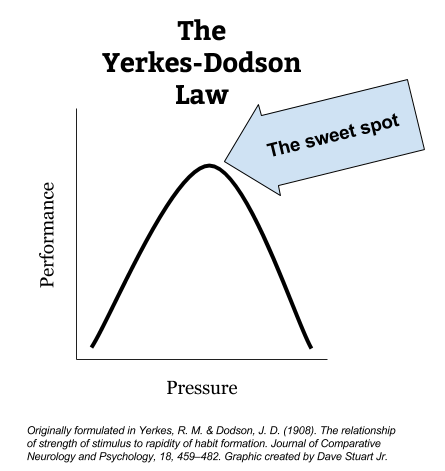A few weeks ago, Grace came to me worried about how tests were making her anxious. She was doing all right on tests at the start of the year, but then she had a bad one, and then at the next one she got really anxious before the test started and while it was happening, and she ended up doing poorly again. And now here she was, talking to me about test anxiety.
She reminded me a lot of me.
Historically, whenever I would see a speaking engagement coming up on the calendar, I would start feeling the nerves — that familiar flutter of queasiness. Normally, I would feel that way even up until the speaking event started. At this point, I've given over 100 talks for strangers, and all that all those reps seemed to have given me was just the realization that the nerves were normal. As another student of mine this year, Martin, once said during a post-pop-up-debate reflection, nervousness can even be seen as a positive — it makes us alert and reminds us that we care.
The trouble is the kind of nervousness — or, call it what it is, anxiety — that Grace and I feel can get to the point where it's debilitating. It's the Yerkes-Dodson curve, which I've written about before.

If Grace and I weren't feeling any pressure at all, we'd probably not study or rehearse, and so we'd perform poorly. But Grace and I find ourselves at the other end of the curve — we're overly pressured because of this mounting feeling of anxiety, and this hinders our performance. I find it easier to procrastinate when I'm overly nervous; Grace's mind goes blank once the tests are handed out.
So recently, I found a beautiful and simple trick, curated by the lovely Dan Pink's even lovelier twice-monthly newsletter. (It's one of the few I read.) In his newsletter, Dan gives these really short “Pinkcasts,” and in a most recent one he shared a study that demonstrated “how (not) to calm your nerves.” (You can watch Dan's overview here, or just keep reading.)
The gist is this: when you're nervous, that's a heightened state of psychological arousal. And what we tend to tell kids like Grace or speakers like me is, “Oh, don't worry! You've got this. Think of how hard you've prepared. It's going to be fine.” Basically, we say, “Calm down!” But according to this study, that's not good advice because it's really hard to just will yourself from a high state of arousal to a low one.
So instead, when you feel those nerves kicking in, you tell yourself that you're excited. “I'm not nervous — I'm excited.”
“I'm jacked. I've been preparing for this test all month. I've been researching for this keynote for years. I get to see some novel test questions today. I get to share what I've been learning in my classroom during this workshop. Sweet. Awesome. Yes.”
It sounds super dumb, actually. But the crazy thing is, Grace and I have found that it works.
During the recent culmination of our class, which is an AP World History class for ninth graders, Grace did the “I'm excited” self-talk, and she had her best-ever performance on the test. What's even more important to me is that she wasn't miserable.
And at a recent keynote to college profs and high school teachers — of writing — I told myself the whole week leading up to the talk that I was pumped. That is was going to be fun. That I was going to meet cool colleagues and learn new things and get some good table talk going during my session. And you know what? It was fun. If I remember right, I might've even eaten breakfast that morning before the speech. I never do that!
So look — like always, it's not a silver bullet. However, this little trick is one of the cooler things I've discovered this year. I hope it helps you and your students, too.
Note from Dave: Cool tricks and neat research like this are the bread and butter of the Student Motivation Course, an all-online, schedule-friendly PD that I'm leading this summer. Here's what one recent course completer shared about the SMC: “I learned so much not just about my students' challenges with motivation, but at times my own. The PD extends not only to being a better teacher, but a better coach, parent, and just a general human being.” That's high praise — thank you, Travis. Learn everything you need to know about the course here.
Prusator says
This is exactly what I have been doing lately! See, I just learned that our very small residential facility, where I have been teaching for 27 years is going to be restructuring. While this is going on, there will be no school So, in the fall I am being sent to the HS. I have not been in this setting ever, and when I got the news I was scared to death. Then I started looking at it as an adventure, and now I am actually excited about it! I am sure when the start dates approaches I will be afraid again, but changing my outlook has helped tremendously! I will have to keep reminding myself to hang on, fasten my seat belt, and enjoy the ride!
davestuartjr says
Prusator, you’ve got it — enjoy the ride indeed 🙂